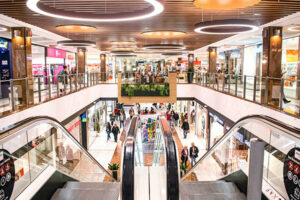By Maxence Liagre
In the last few years, the placemaking strategy for the shopping center industry has become undisputable, whether we consider performing assets or future developments. The year 2020 has just emphasized that, thus increasing pressure for its implementation as the reality of Mother Nature and the sudden need for social distancing have pushed even more customers to embrace e-commerce. Since the debut of the concept, placemaking at shopping centers has evolved a lot – while initially architectural in approach, new layers have been added every year: socializing, networking, shopping, dining, living, working, etc. The concept seems to have no limits, because it embraces everything about all kinds of people, all kinds of lifestyles, and all kinds of communities. Placemaking at shopping centers is a single concept comprised of multiple components. This year, the two most important aspects that stand-out are health and accelerated full e-commerce integration.
Health concerns will not disappear from people’s mind and habits as Covid-19 subsides. Shopping centers in the future should remain “safe zones”, as they had previously been for decades in terms of security. Visitors should feel relaxed and protected while visiting shopping centers, and the future will surely see the integration of preventative measures and policies into an expected part of the shopping center landscape. We will, however, need to adapt our communication in an effort to switch from a fear-inducing and stress-provoking tone to a calm, confident, and reassuring softer approach. Doing that will change the image perception of shopping centers as the “risky places” that lockdowns first targeted. Additionally, we will remain alert for any future challenges, while keeping in mind that placemaking is about health, happiness, and wellbeing.
An additional challenge of our placemaking strategy for shopping centers is e-commerce and its increasing importance in people’s lives. Therefore, we have to be fully committed to quickly integrating it in the best possible way. We need to be proactive and lead the process of bringing e-commerce to our centers, with the understanding that we have many arguments against doing so. That means establishing centralized “Click & Collect” high-quality services for our tenants and customers by dedicating proper resources and spaces. Shopping centers should become e-commerce destinations of preference, as we have the capability to add the “physical experience” to the e-shopping convenience, thus bringing back sales and visitors to our centers. Aside from our tenants, we should also offer those services to all pure e-commerce operators as a qualitative and economic alternative to classic delivery networks. Further potential and possibilities are practically endless, as the core idea of placemaking is about creating high-quality destinations in which people want to be.
As the expectations for 2021, at least with regards to the second half of it, should be better for our industry, now is the perfect time to act. Just as the “baby boom” was a result of a sudden explosion of freedom following a long period of frustration, we can realistically expect a “shopping center boom” later next year. That is precisely why we need to prepare ourselves to be more attractive – to show that we have changed, that we are even better, and that this forced separation has taught us to value our much-loved customers on a completely new level.






